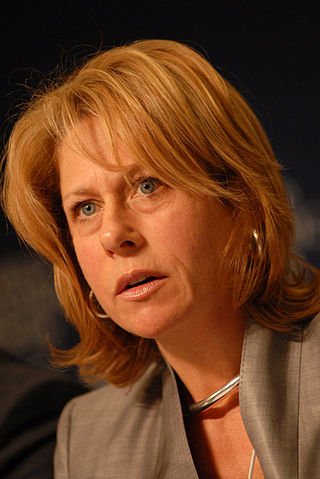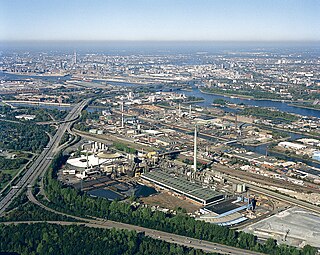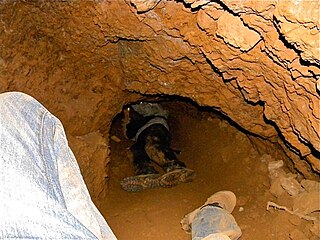
Mining is the extraction of valuable geological materials and minerals from the Earth and other astronomical objects. Mining is required to obtain most materials that cannot be grown through agricultural processes, or feasibly created artificially in a laboratory or factory. Ores recovered by mining include metals, coal, oil shale, gemstones, limestone, chalk, dimension stone, rock salt, potash, gravel, and clay. The ore must be a rock or mineral that contains valuable constituent, can be extracted or mined and sold for profit. Mining in a wider sense includes extraction of any non-renewable resource such as petroleum, natural gas, or even water.

Corporate social responsibility (CSR) or corporate social impact is a form of international private business self-regulation which aims to contribute to societal goals of a philanthropic, activist, or charitable nature by engaging in, with, or supporting professional service volunteering through pro bono programs, community development, administering monetary grants to non-profit organizations for the public benefit, or to conduct ethically oriented business and investment practices. While once it was possible to describe CSR as an internal organizational policy or a corporate ethic strategy similar to what is now known today as Environmental, Social, Governance (ESG); that time has passed as various companies have pledged to go beyond that or have been mandated or incentivized by governments to have a better impact on the surrounding community. In addition national and international standards, laws, and business models have been developed to facilitate and incentivize this phenomenon. Various organizations have used their authority to push it beyond individual or even industry-wide initiatives. In contrast, it has been considered a form of corporate self-regulation for some time, over the last decade or so it has moved considerably from voluntary decisions at the level of individual organizations to mandatory schemes at regional, national, and international levels. Moreover, scholars and firms are using the term "creating shared value", an extension of corporate social responsibility, to explain ways of doing business in a socially responsible way while making profits.
A sustainable business, or a green business, is an enterprise that has a minimal negative impact or potentially a positive effect on the global or local environment, community, society, or economy—a business that strives to meet the triple bottom line. They cluster under different groupings and the whole is sometimes referred to as "green capitalism." Often, sustainable businesses have progressive environmental and human rights policies. In general, a business is described as green if it matches the following four criteria:
- It incorporates principles of sustainability into each of its business decisions.
- It supplies environmentally friendly products or services that replace demand for nongreen products and/or services.
- It is greener than traditional competition.
- It has made an enduring commitment to environmental principles in its business operations.

The China Geological Survey (CGS) (Chinese: 中国地质调查局) is a government-owned, not-for-profit, Chinese organization researching China's mineral resources. It is a public institution managed by the State Council's ministries and commissions responsible for geological and mineral exploration under the State Council of the People's Republic of China. According to the national land and resources survey plan, it is now managed by the Ministry of Natural Resources. It is the largest Geoscience agency in China since being reinstated in 1999, and the headquarter is in Beijing, the capital of China.

Cynthia Blum Carroll is an American businesswoman. She was the chief executive officer of Anglo American PLC, a South African mining company, which, among other things, is the world's largest platinum producer.
The International Institute for Environment and Development (IIED) is an independent policy research institute whose stated mission is to "build a fairer, more sustainable world, using evidence, action and influence in partnership with others." Its director is Dr Tom Mitchell.

The Mining industry of Ghana accounts for 5% of the country's GDP and minerals make up 37% of total exports. Gold contributes over 90% of the total mineral exports. Thus, the main focus of Ghana's mining and minerals development industry remains focused on gold. Ghana is Africa's largest gold producer, producing 80.5 t in 2008. Ghana is also a major producer of bauxite, manganese and diamonds. Ghana has 20 large-scale mining companies producing gold, diamonds, bauxite and manganese; over 300 registered small scale mining groups; and 90 mine support service companies.Other mineral commodities produced in the country are natural gas, petroleum, salt, and silver.

The Ministry of Mines is the ministry in the Government of India. The ministry functions as the primary body for the formulation and administration of laws relating to mines in India. The head of the ministry is Pralhad Joshi, who has been serving since June 2019.
The Minerals Council of Australia (MCA) is an industry association, notable for representing companies that generate most of Australia's mining output. The MCA was founded in 1995, succeeding the Australian Mining Industry Council which was established in 1960. It is unrelated to the former Australian Minerals Council, which was established in 1946 as an intergovernmental forum between state and federal government ministers.

The mineral industry of Peru has played an important role in that nation's history and been integral to the country's economic growth for several decades. The industry has also contributed to environmental degradation and environmental injustice; and is a source of environmental conflicts that shape public debate on good governance and development.

Aurubis AG is a global supplier of non-ferrous metals and one of the world's largest copper recyclers. The company processes complex metal concentrates, scrap, organic and inorganic metal-bearing recycling materials and industrial residues into metals. Aurubis produces more than 1 million tons of copper cathodes per year and from these a variety of products such as wire rod, continuous cast shapes, profiles and flat rolled products in copper and copper alloys. Aurubis also produces a range of other metals, including precious metals such as selenium, lead, nickel, tin and zinc. The portfolio also includes other products such as sulfuric acid and iron silicate.

An artisanal miner or small-scale miner (ASM) is a subsistence miner who is not officially employed by a mining company, but works independently, mining minerals using their own resources, usually by hand.

Mark Cutifani is an Australian businessman and chair of the energy transition metals board at Vale Base Metals. He is a non-executive director of Total S.A. Cutifani is the former chief executive of mining group, Anglo American plc where he also served as a member of the Board. He was formerly CEO of South African gold mining company AngloGold Ashanti. Cutifani is a fellow of the Royal Academy of Engineering, a board member of the Hydrogen Council., recipient of the AusIMM Institute Medal. and Mines and Money Lifetime Achievement Award winner.

The Mines and Geo-sciences Bureau (MGB) is a government agency of the Philippines under the Department of Environment and Natural Resources (DENR). The MGB is responsible for the conservation, management, development and use of the country's mineral resources, including those in reservations and public lands.

The European Association of Mining Industries, Metal Ores & Industrial Minerals (Euromines) was founded in 1996 to represent several national mining associations mainly from Western Europe. Today the association is the recognized representative of the European metals and minerals mining industry and represents 19 national European federations and 28 companies as direct members from the whole Europe. Altogether large and small member companies and their subsidiaries in Europe and in other parts of the world provide jobs to more than 350,000 people. Through the activities and operations of these members, more than 42 different metals and minerals are produced. For some metals and minerals, Europe is the world's leading producer.
The International Cyanide Management Code for the Manufacture, Transport and Use of Cyanide in the Production of Gold, commonly referred to as the Cyanide Code, is a voluntary program designed to assist the global gold and silver mining industries and the producers and transporters of cyanide used in gold and silver mining in improving cyanide management practices and to publicly demonstrate their compliance with the Cyanide Code through an independent and transparent process. The Cyanide Code is intended to reduce the potential exposure of workers and communities to harmful concentrations of cyanide‚ limit releases of cyanide to the environment‚ and enhance response actions in the event of an exposure or release.
The Cross-Sector Biodiversity Initiative (CSBI)] is a partnership between IPIECA - the global oil and gas industry association for environmental and social issues, the International Council on Mining and Metals (ICMM) and the Equator Principles Association to develop and share good practices related to management of biodiversity and ecosystem services in the extractive industries.
The Voluntary Principles on Security and Human Rights is a collaborative effort by governments, major multinational extractive companies, and NGOs to provide guidance to companies on tangible steps that they can take to minimize the risk of human rights abuses in communities located near extraction sites. The principles documents provide guidance to companies in developing practices that maintain the safety and security of their operations while respecting the human rights of those who come into contact with security forces related to those operations. The Principles give guidance on risk assessment, public safety and security, human rights abuses, and the interaction between companies and private and public security.
Jean-Sébastien Dominique Francois Jacques is a former chief executive officer of Rio Tinto Group. He succeeded Sam Walsh in July 2016. He was succeeded by Jakob Stausholm in early 2021.












